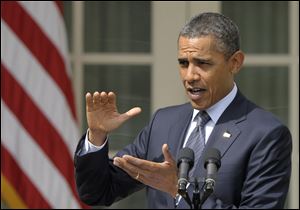
President takes tough debt stand
Details of tax plan revealed
9/20/2011
President Obama tells Republicans, who dismissed his plan, ‘We can’t just cut ourselves out of this hole.’ The President seems to have abandoned his design of being the one eager to compromise.
WASHINGTON — With a scrappy unveiling of his formula to rein in the nation’s mounting debt, President Obama confirmed Monday that he has entered a new, more combative phase of his presidency, one likely to last until next year’s election as he battles for a second term.
Faced with falling poll numbers for his leadership and an anxious party base, Mr. Obama did not just propose but insisted that any long-term debt-reduction plan must not shave future Medicare benefits without also raising taxes on the wealthiest taxpayers and corporations.
He uncharacteristically backed up that stand with a veto threat, setting up a politically charged choice for anti-tax Republicans — protect the most affluent or compromise to attack deficits. Confident in the answers most voters would offer, he plans to hammer on that choice through 2012, reflecting the fact that the White House has all but given up hopes of a “grand bargain” with Republicans to restore fiscal balance for years to come.
“I will not support — I will not support — any plan that puts all the burden for closing our deficit on ordinary Americans. And I will veto any bill that changes benefits for those who rely on Medicare but does not raise serious revenues by asking the wealthiest Americans or biggest corporations to pay their fair share,” he said in the Rose Garden. “We are not going to have a one-sided deal that hurts the folks who are most vulnerable.”
He also seems to have given up on his strategy of nearly a year, starting when Republicans won control of the House last November, of being the eager-to-compromise “reasonable adult” — in the White House’s phrasing — in his relations with them. He had sought to build a personal relationship with Speaker John Boehner (R., Ohio), a man the White House saw as a possible partner across the aisle, in the hopes of making bipartisan progress and winning points with independent voters who disdain partisanship. Even if the efforts produced few agreements with Republicans, the White House figured, independents would give Mr. Obama credit for trying.
Instead, the President was unable to close his deal with Mr. Boehner and has lost independents’ support and left Democrats disillusioned, raising doubts about his re-election prospects.
The proposal announced by the President Monday would predominantly hit upper-income taxpayers and would target tax loopholes and subsidies used by many larger corporations. It would spare retirees from any changes in Social Security, and it would direct most of the cuts in Medicare spending to health-care providers, not beneficiaries.
Benefit programs wouldn’t be unscathed. His plan would reduce spending for those, including Medicare and Medicaid, by $580 billion.
Administration officials said 90 percent of the $248 billion in 10-year Medicare cuts would be squeezed from service providers such as drug companies, hospitals, and nursing homes. Still, starting in 2017, the plan significantly would raise what many seniors pay for premiums, copayments, and deductibles. AARP, the lobbying group for older Americans, said it was troubled by some of the proposals but grateful the President didn’t include an increase in the Medicare eligibility age and cuts to Social Security.
His plan would count savings of $1 trillion over 10 years from the withdrawal of U.S. troops from Iraq and Afghanistan.
The GOP has ridiculed the war savings as gimmicky, but House Republicans included them in their budget proposal this year and Mr. Boehner had agreed to count them as savings during his debt ceiling negotiations with the president this summer.
It’s not just millionaires who’d pay more under President Obama’s plan.
Air travelers, federal workers, military retirees, wealthier Medicare beneficiaries, and people taking out new mortgages would pay more than $130 billion in government revenues raised through new or increased fees.
Airline passengers would see their federal security fees double from $5 to $10 for a nonstop round-trip flight and triple to $15 by 2017, raising $25 billion over the coming decade. Federal workers would face an extra 1.2 percentage point deduction from their paychecks to contribute $21 billion more for their pensions over the same period. Military retirees would pay a $200 fee upon turning 65 to have the government pay their out-of-pocket Medicare expenses. And it’ll cost corporate jet owners a new $100 fee for each flight.
The deficit-reduction plan represents President Obama’s longer-term follow-up to the $447 billion in tax cuts and new public works spending that he has proposed as a short-term measure to stimulate the economy.
Defending his emphasis on new taxes rather than only spending reductions, Mr. Obama said, “We can’t just cut our way out of this hole.”
The Republican reaction was swift and bluntly dismissive.
“Veto threats, a massive tax hike, phantom savings, and punting on entitlement reform is not a recipe for economic or job growth — or even meaningful deficit reduction,” Senate Republican leader Mitch McConnell said.
The plan represents Mr. Obama’s opening bid in the debate. Administration officials say he is not taking other deficit reduction measures, including a gradual increase in the eligibility age for Medicare from 65 to 67, off the table. In deficit reduction negotiations in July with Mr. Boehner that centered on raising the nation’s borrowing capacity, Mr. Obama had agreed to such an age increase. But other Democrats objected loudly.
The core of the President’s plan totals just over $2 trillion in deficit reduction in 10 years. The plan would let Bush-era tax cuts for upper income earners expire, limit deductions for wealthier filers and close loopholes, and end some corporate tax breaks.